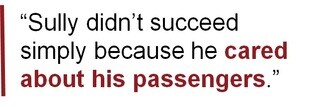
By Maryann Woods-Murphy
I love the true story of Captain Chesley (Sully) Sullenberger, the heroic US Air captain who made an emergency landing on the freezing Hudson River in January 2009. Sully is played masterfully by Tom Hanks in a newly released film by Clint Eastwood that left me marveling at his expertise in a time of crisis and thinking about my career as a teacher under pressure.
For those with only a vague recollection of the story, here’s a brief recap. Shortly after flight 1549 took off from LaGuardia, a flock of Canadian geese collided with the plane, causing both engines to burst into flames and lose thrust. Realizing that the aircraft was losing altitude rapidly and preventing a return to the airport, Captain Sully had only seconds to decide to land on the water. In an interview with Katie Couric soon after, Sully explained how he made this wildly unorthodox call. “For 42 years I’ve been making small, regular deposits in this bank of experience, education and training,” Sully told Couric, “and on January 15, the balance was sufficient so that I could make a very large withdrawal.”
As a lifelong educator, I can relate. My colleagues and I work quickly in complex environments to perfect our craft. It is our ongoing,

human interactions that inform our expertise--helping a child whose mother has died, finding food for a student who had no breakfast, or teaching a class not to bully a new student who seems different. It is through these day-to-day “regular deposits” that we cultivate an extensive repertoire of strategies that contribute to a greater “bank” of experience that we can readily access when the situation calls for it.
I wish more people understood the complex nature of our work as teachers. Understanding is conspicuously absent from most conversations about how to “fix” education. Discussions tend to focus on professional learning, reviewing data and building teacher knowledge. District and state policymakers must understand that improving teaching has to be about more than giving teachers PD or having them learn more content. Educators need time and the experiences gained through daily interactions with students to build their practice and become masters.
To be clear, I am not arguing that school improvement is all about recapturing the “joy factor” and focusing on the importance of play, compassion and soft skills. This is a false binary. Sully didn’t succeed simply because he cared about his passengers. He relied on his

training and clearly knew his stuff. Yet the film makes clear that no training or simulation alone would have given Sully and his co-pilot all of the answers about what to do on that fateful day. Instead, they drew upon a reservoir of skills and knowledge borne of many experiences to bring all 155 of his passengers and crew to safety.
When they landed, it wasn’t all accolades for Sully and his copilot. In many ways, their larger problem had just begun. Following their landing, the two faced a great deal of intense scrutiny that threatened their careers, confidence and reputation. “You should have turned back,” some officials said, implying that they could have made it to LaGuardia and that in not doing so, they went against recommendations.
Teachers too make professional judgments in a split second that sometimes seem unconventional--or even crazy--afterward. And then we hear it. “This is not how we learned math!” parents complain. Or: “These kids should be reading the classics, not comic books!”
Of course, teachers perform public professional work that is open to the questions and concerns of educational stakeholders. Teachers should understand the efficacy of their methods and strategies and know how to explain them to people who learned another way. Still, I know I speak for many when I say that teachers wish we were given a little credit, a little benefit of the doubt, sometimes.
Teachers are professionals, and we want parents and administrators to understand that we see ourselves guardians of our nation’s children and our collective future. We are far from perfect, but please ask questions before you call us or our methods crazy. Recognize us as caring and expert professionals who intend to use every bit of our knowledge and experience to help our students soar. And when the time has come, we will see them safely to ground.
Maryann Woods-Murphy is the 2010 New Jersey State Teacher of the Year and a member of NNSTOY. She serves as a gifted and talented specialist in Nutley, New Jersey.
